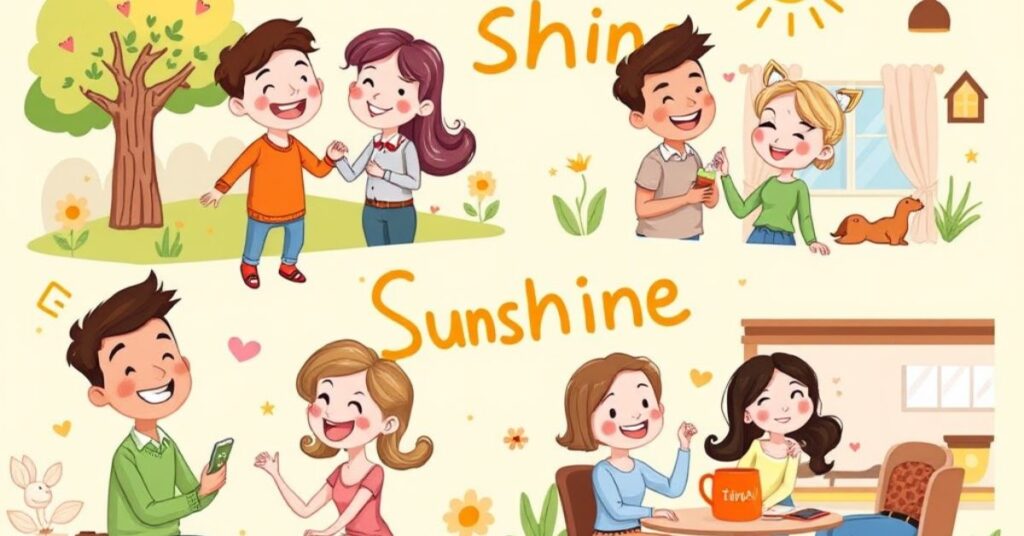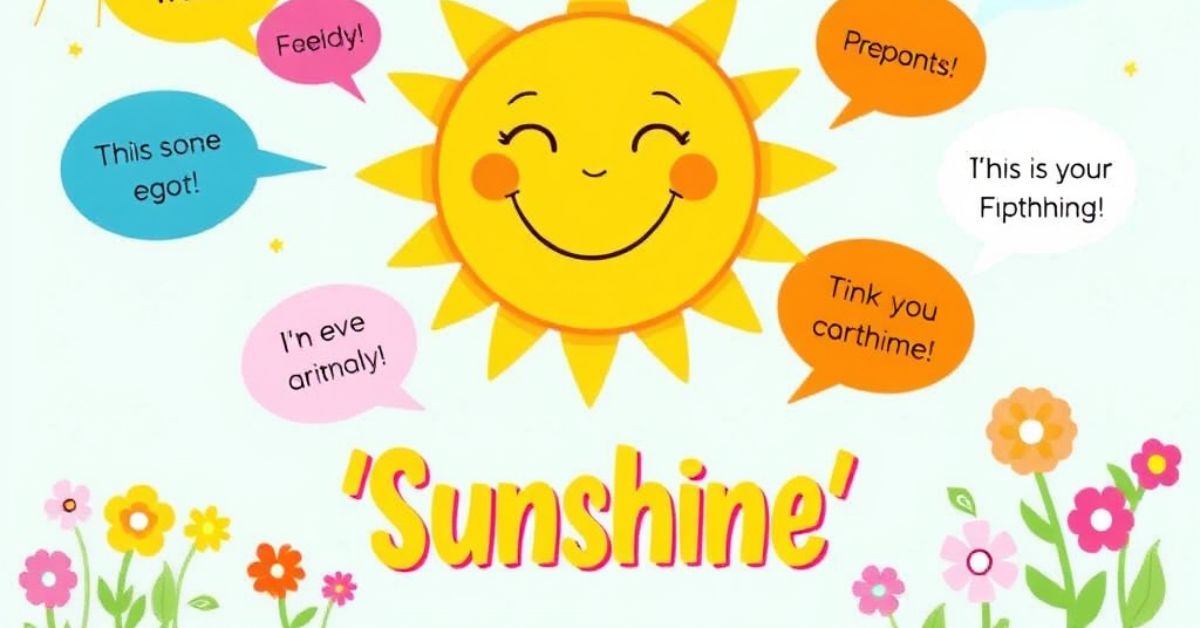In a world filled with everyday stresses, a simple nickname like “Sunshine” can bring warmth and a smile to your face. Whether it’s a playful compliment, a term of endearment, or a lighthearted tease, being called “Sunshine” can evoke a range of feelings.
This article explores various responses to this delightful nickname, providing you with an arsenal of witty comebacks, charming replies, and thoughtful reflections. Let’s dive into the sunny side of life!
Understanding the Meaning Behind “Sunshine”
The term “Sunshine” often symbolizes brightness, positivity, and warmth. It’s a way to express affection or highlight someone’s cheerful personality.
When someone calls you “Sunshine,” they’re likely acknowledging the light you bring into their life or the joy you radiate. Embracing this nickname can enhance your connection with others and spread positivity.
Who Is Calling You “Sunshine”?

The context in which you’re called “Sunshine” can vary widely. It could be a close friend, a romantic partner, a family member, or even a colleague.
Understanding the relationship you have with the person using the nickname can guide your response. For instance, a playful reply to a friend might differ from a more reserved response to a colleague.
When Is “Sunshine” Being Used?
“Sunshine” can pop up in various scenarios. It might be used during a casual chat, in a flirty exchange, or as a comforting gesture when someone senses you’re down.
Recognizing the intent behind the nickname can help you choose the most fitting response, enhancing the moment’s positivity.
Positive Responses to “Sunshine”
- “Right back at you! You’re my sunshine!”
A heartfelt reply that reciprocates the compliment. - “Thanks! I’ll try to shine even brighter!”
A playful acknowledgment that adds to the fun. - “Aw, you just made my day!”
Perfect for expressing gratitude and spreading joy. - “Sunshine is my middle name!”
A cheeky response that adds humor to the conversation.
Playful and Witty Comebacks
- “Only if you’re my cloud!”
A fun banter that plays on the weather theme. - “And you’re the reason I need sunglasses!”
A witty comeback that adds a flirtatious edge. - “Does that mean I can skip the sunscreen?”
A lighthearted joke that keeps the mood cheerful. - “Careful, I might just start glowing!”
An exaggerated response that invites laughter.
When You’re Not Comfortable With “Sunshine”
If being called “Sunshine” makes you uncomfortable, it’s okay to express that. Here are some gentle ways to respond:
- “I appreciate the sentiment, but I prefer my name.”
A straightforward yet polite way to set boundaries. - “That’s sweet, but I’m not really a ‘sunshine’ kind of person.”
An honest response that maintains a friendly tone. - “I’m more of a ‘cloudy with a chance of rain’ person!”
A humorous way to convey your feelings without being harsh. - “Thanks, but I’m feeling a bit more like a moon today.”
A creative twist that expresses your mood while keeping it light.
Cultural and Emotional Impact of Nicknames
Nicknames like “Sunshine” can have cultural significance, reflecting warmth and affection across various societies. They can strengthen bonds, convey familiarity, and even serve as a source of comfort. Understanding the emotional weight of such terms can deepen your appreciation for the connections you share with others.
Navigating Gender and Professional Boundaries
In professional settings, the use of terms like “Sunshine” can be tricky. While some may view it as a friendly gesture, others might find it overly familiar. It’s essential to gauge the context and relationship dynamics. If you’re unsure, opting for a more neutral response can help maintain professionalism.
How to Use “Sunshine” in Return
If you’re inspired to use “Sunshine” as a nickname for someone else, ensure it’s appropriate for your relationship. Here are some tips:
- Use it in light-hearted contexts.
Ensure the moment feels relaxed and friendly. - Gauge their reaction.
Pay attention to how they respond; if they seem pleased, continue using it. - Mix it up!
Pair it with their name for a personal touch, e.g., “Sunshine Sarah!” - Be authentic.
Use it genuinely to foster warmth and connection.
Conclusion
Being called “Sunshine” can brighten your day and strengthen your relationships. Whether you prefer playful banter, heartfelt replies, or setting boundaries, having a variety of responses at your fingertips can be incredibly useful. Embrace the positivity, and don’t hesitate to share your favorite replies or experiences with this delightful nickname! Let your own sunshine shine bright!
FAQ,s
What does it mean when someone calls me “Sunshine”?
Being called “Sunshine” typically signifies affection, positivity, and warmth. It’s a way to express how someone values the light you bring into their life.
How should I respond if I feel uncomfortable being called “Sunshine”?
It’s perfectly fine to express your discomfort. You can politely say something like, “I appreciate the sentiment, but I prefer my name.”
Can I use “Sunshine” as a nickname for someone else?
Yes, you can! Just ensure it’s appropriate for your relationship and the context. Gauge their reaction to see if they appreciate it.
Is “Sunshine” used differently in various cultures?
Yes, nicknames like “Sunshine” can have cultural significance, often reflecting warmth and familiarity. Their impact can vary across different societies.
What are some witty comebacks for being called “Sunshine”?
Some fun responses include “Only if you’re my cloud!” or “Does that mean I can skip the sunscreen?” These keep the conversation lighthearted.
When is it appropriate to use “Sunshine” in a professional setting?
Use caution in professional environments. Gauge the relationship and context; if it feels too familiar, it’s best to opt for a more neutral term.

Emily Rose Johnson is a passionate writer with a knack for crafting engaging content. She specializes in communication strategies, digital marketing, and creative storytelling.









